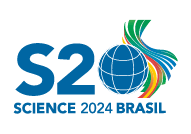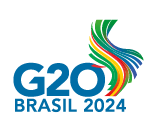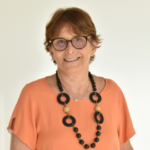Science 20 debates in Rio transformations in Science and Technology
March 11 | Agência Brasil
Rio de Janeiro is hosting the Science 20 (S20) on Monday (11) and Tuesday at the Windsor Barra Hotel, a G20 engagement group focusing on science and technology. As Brazil is hosting the G20 this year, it is the responsibility of the Brazilian Academy of Sciences (ABC) to organize the meeting, which includes representatives from the science academies of 19 countries plus the European Union, and also including the African Union. The theme defined by the ABC is Science for Global Transformation.
Helena Nader, president of the ABC, stated that the S20 will discuss five themes: bioeconomy: driving the world towards a sustainable planet; health challenges: quality, equity, and access; artificial intelligence (AI): ethics, social impact, regulation, and knowledge sharing; social justice: promoting inclusion, ending poverty, and reducing inequalities; and energy transition process: renewable energies, social and economic considerations.
These five themes will be worked on by the groups subsequently, in an online and separate format, aiming to produce a final document with suggestions. The groups will reconvene in July to define the statement to be sent to the G20 in November. A document sent by the ABC to all participating academies is already receiving contributions.
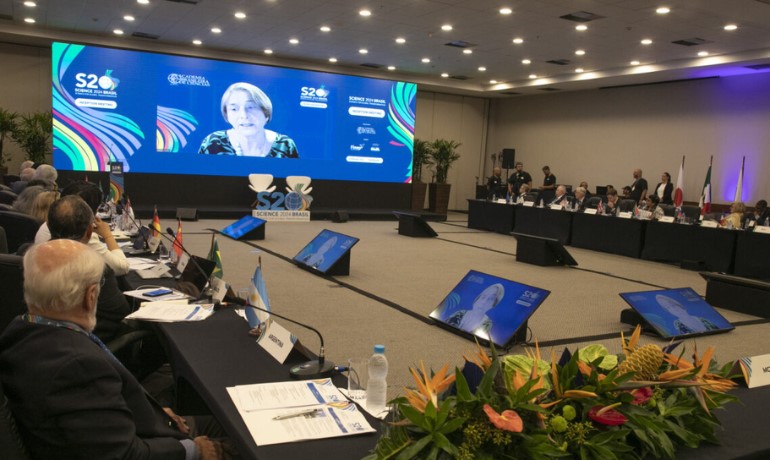
Helena Nader on the big screen and participants of S20 Brazil | Photo: Marcos André Pinto
Convergence
According to Helena, the idea of the meeting now is to try to achieve convergence among the participating institutions, “because the topics to be discussed have a global impact. If we don’t start to converge, the world won’t move forward,” she said. She also mentioned the importance of having the African network at the event, as it will dialogue with the other science academies on the continent.
This will be the fifth year Helena participates in S20 meetings. Previous meetings were held in Saudi Arabia, Italy, Indonesia, and India. Engagement groups will also be present at the meeting, including those related to oceans and think tanks. “We are trying to achieve convergence. Health, for example, depends on science, education. The more groups propose converging ideas, the greater the chance governments will include them in the final document.”
Demographics
The president of the ABC emphasized that global health is always discussed as a very important topic. In this Brazilian edition, she said it is necessary to go beyond that. “In this edition, we are bringing an extremely relevant aspect that the world is not discussing with the intensity it should, which is demographic differences. The demands of some countries are for science, education, and health actions focused on children and young people.”
Helena drew attention to the fact that in most G20 countries, such as Japan and China, and in Latin America, demographic aging is significant, while India and Indonesia are countries with a majority of young populations. “The demands are different, and you have to have this perspective.” Therefore, she argued that health projects must look at the world as a whole. “It’s not enough to just look at the rich because, if you pay attention, several serious health crises, apart from COVID-19, have occurred in economically vulnerable countries. Like what is happening now with dengue.”
Considered a disease of poor tropical countries, dengue is already present in the United States and, this year, will affect more American states and more countries, noted the president of the ABC. Therefore, she stated that mosquitoes that transmit diseases, viruses, bacteria “do not need a passport. They can enter anywhere. These are the aspects we want to bring to the S20.”
Conferences
The Inception Meeting, which will be held today and tomorrow, will feature four conferences and a new project from the United Nations Educational, Scientific and Cultural Organization (UNESCO) focused on science learning for education.
The conferences will be given by Fernanda De Negri, an economist and director of sectoral studies at the Institute of Applied Economic Research (Ipea), on Artificial Intelligence: Challenges for Democracy and Society, and Márcia Castro, a demographer and head of the Department of Global Health and Population at the Harvard T.H. Chan School of Public Health, on Demography and Health Challenges in the G20.
Carlos Henrique de Brito Cruz, Senior Vice President of Elsevier Research Networks and Professor Emeritus at the State University of Campinas (Unicamp), will speak on Opportunities and Challenges for Research Collaboration in the G20, and Pedro Wongtschowski, President of the Superior Council for Innovation at the Federation of Industries of the State of São Paulo (Fiesp), will address Innovation for Social Inclusion and Sustainability.
Orientation
In the preliminary document sent to the G20 Science Academies, the ABC highlighted that “as the world continues to face the multifaceted impacts of the pandemic and still faces conflicts in different regions of the world, leaders are likely to use this relevant group to coordinate efforts in vaccine distribution, economic recovery, strengthening health systems, and the science and technology needed to accomplish it. Collaborative initiatives and emerging policy decisions from this meeting will play a central role in guiding the path towards a more resilient situation and inclusive global recovery,” it indicated.
Regarding the G20, the document notes that the meeting in Brazil presents a vital opportunity to address urgent environmental issues and promote sustainable development. “Brazil, as a country that covers a large part of the Amazon, a critical global ecosystem, is expected to present discussions on environmental conservation, biodiversity, and protection and mitigation of climate change.” According to the ABC, as the world faces an escalation of environmental challenges, decisions made at this meeting could define the future of the international community.
Helena Nader also stated in the document that the G20 meeting has the potential to catalyze significant progress towards a sustainable and resilient future for the entire planet. The slogan “Building a fair world and a sustainable planet” expresses Brazil’s willingness and commitment to promote fair agreements that foster development. It also highlights Brazil’s motto for this term – reducing hunger, poverty, and inequality worldwide, as well as socio-environmental development that includes fair and inclusive life, in addition to ecological transition.
Tonight, during the welcome dinner, the cultural part will be provided by the Maré do Amanhã Orchestra, created in 2010, which teaches classical music to children and adolescents from one of the most violent favelas in Rio de Janeiro. The orchestra’s differential is not only being a social project but also offering a real opportunity for life change for its students, preparing each one for the job market and preventing them from being recruited by drug trafficking.
The S20
The Science 20 (S20) is the engagement group for science and technology in the G20. Formed by the national academies of sciences of the G20 countries, the group promotes dialogue between the scientific community and policymakers. The group was established in 2017 and has a rotating non-permanent secretariat. The S20 operates as a forum, with its meetings held annually before the G20 summit.
Throughout the annual cycle, S20 members address relevant topics and formulate documents with specific recommendations and actionable measures for the G20. These proposals form the basis of the S20 communiqué, which is officially presented to the G20 leaders for consideration. Previous editions of the S20 were held in Germany (2017), Argentina (2018), Japan (2019), Saudi Arabia (2020), Italy (2021), Indonesia (2022), and India (2023).
Participating in the S20 are the academies of sciences of South Africa, Germany, Saudi Arabia, Argentina, Australia, Brazil, Canada, China, South Korea, the United States, France, Japan, India, Indonesia, Italy, Mexico, the United Kingdom, Russia, Turkey, and the Academia Europaea, representing the European Union. For the first time, international scientific organizations were invited to participate in the annual S20 process. Representatives from the InterAcademy Partnership, International Science Council, World Academy of Sciences, InterAmerican Network of Academies of Sciences, and Association of Academies and Societies of Sciences of Asia have been confirmed.
The Science20 Brazil 2024 has as its Sherpa, the name given to those who coordinate the debates and activities, the president of the ABC, Helena Bonciani Nader. The meeting is supported by the Brazilian Funding Authority for Studies and Projects (Finep) and the Ministry of Science, Technology, and Innovation.
